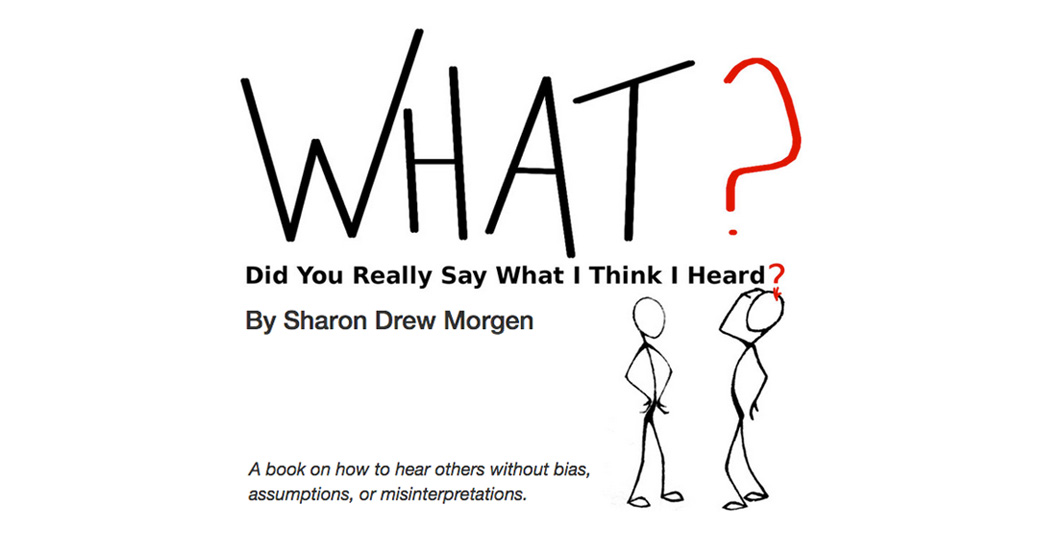Assumptions: Why being right is wrong
While researching my book What? I discovered that we may not accurately understand what others are saying to us: due to the way ears ‘hear’ (not very well) we only accurately understand some unknowable percentage of what’s been said.
Turns out our listening is pretty subjective. And since listening is such a crucial element in communication and there’s a possibility we misunderstand what’s been said, any assumptions we make must be subject to self-doubt.
While we don’t have choice over how our brain (mis)translates incoming words, we can have more personal choice with more awareness of our brain’s process. Did you know:
- We only retain words we hear for approximately 3 seconds, and since spoken words have no spaces between them, our brains must also listen for breaks in breath, tone, and rhythm to differentiate words and meaning.
- Our brain interprets incoming words through already-existing circuits. That means if what was said is ‘similar enough’ to something we’ve heard before, our brain translates it according to the original, most likely misinterpreting the new content.
A simple example of this just happened today when I was introduced to someone:
Joe: Hey V. I’d like you to meet my friend Sharon-Drew.
V: Hi Sharon.
SDM: Actually, my first name is Sharon-Drew and I always use them both together.
V: Oh. I don’t know anyone who calls themselves by their first name AND last name.
SDM: Neither do I.
V: But you just told me that’s how you refer to yourself!
Because my double first name was foreign to her, her brain used a habituated pathway and misinterpreted my name as Joe introduced us and my correction.
This type of thing happens daily. We believe what our brain tells us, make follow-on assumptions then act on them, and never doubt ourselves. Unfortunately, we often assume we’re ‘right’ and end up being wrong.
ASSUMPTIONS RESTRICT AUTHENTIC COMMUNICATION
Brains are set up to routinize and habituate most of what we do and hear. It makes the flow of our daily activities and relationships easy.
But there is a downside: because our brain is mechanical, unconscious and automatic, it doesn’t consider ‘meaning’ during the electrochemical process between a Speaker’s words and a Listener’s understanding.
With so many deletions and distortions in the process, we end up making assumptions based on what we think we heard, and assume we’re ‘right’ regardless of the truth. When I asked a magazine editor to correct the name Charlotte Morgan that appeared under my photo he replied (and I can’t make this stuff up!): “I didn’t get it wrong. You must have sent it to me wrong.” True story.
THE COST OF ASSUMING
Assumptions are a natural part of how we think. But especially in leadership situations, they can cause harm:
- Sellers assume prospects are buyers when they ‘hear’ a ‘need’ based on their biased questions and end up wasting a huge amount of time chasing prospects who will never buy;
- Consultants assume they know what a client needs from discussions with only a few top decision makers causing resistance to change when they implemented to people not included.
- Decision scientists assume they gather accurate data from the people that hired them and discount important data held by employees lower down the management chain, inadvertently skewering the results and making implementation difficult;
- Doctors, lawyers, dentists sometimes make flawed assumptions when they hear issues similar to other patients they’ve had potentially causing harm – especially when these assumptions keep them from finding out the real problems. They also offer important advice that clients/patients don’t heed when the patients themselves hear inaccurately;
- Coaches assume clients mean something they are not really saying or skewering the focus of the conversation, ending up biasing the outcome with inappropriate questions that lead the client away from the real issues that never get resolved;
- Influencers and leaders off their solutions then blame the Other for resisting, ignoring, or sabotaging, when the assumed solution procures resistance.
To have more personal choice around when, how, if you make assumptions, ask yourself:
- How do I know if my assumptions are accurate? And if they’re inaccurate, how will I know?
- What would I need to believe differently to ‘assume’ I might not be correct, and be willing to ask more questions to elicit accurate data?
- What is making inaccurate assumptions costing me?
Assumptions are costly when they’re inaccurate. How will you know the difference between accurate ones and faulty ones?
____________
Sharon-Drew Morgen is a breakthrough innovator and original thinker, having developed new paradigms in sales (inventor Buying Facilitation®, listening/communication (What? Did you really say what I think I heard?), change management (The How of Change™), coaching, and leadership. She is the author of several books, including her new book HOW? Generating new neural circuits for learning, behavior change and decision making, the NYTimes Business Bestseller Selling with Integrity and Dirty Little Secrets: why buyers can’t buy and sellers can’t sell). Sharon-Drew coaches and consults with companies seeking out of the box remedies for congruent, servant-leader-based change in leadership, healthcare, and sales. Her award-winning blog carries original articles with new thinking, weekly. www.sharon-drew.com She can be reached at sharondrew@sharondrewmorgen.com.
Sharon Drew Morgen February 10th, 2025
Posted In: Listening



